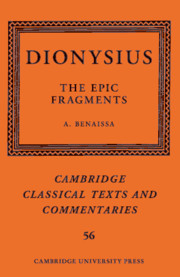Book contents
- Frontmatter
- Dedication
- Contents
- Preface
- Introduction
- Remarks on Editorial Conventions and the Presentation of the Fragments
- Sigla
- The Fragments of the Bassarica: Text, Critical Apparatus, Translation
- Commentary
- Title of Poem
- Appendix: The Fragments of the Gigantias
- Concordance of Fragments
- Bibliography
- Indexes
Title of Poem
from Commentary
Published online by Cambridge University Press: 01 February 2018
- Frontmatter
- Dedication
- Contents
- Preface
- Introduction
- Remarks on Editorial Conventions and the Presentation of the Fragments
- Sigla
- The Fragments of the Bassarica: Text, Critical Apparatus, Translation
- Commentary
- Title of Poem
- Appendix: The Fragments of the Gigantias
- Concordance of Fragments
- Bibliography
- Indexes
Summary
The substantivized adjective constituting the title is rare; cf. Phal. AP 6.165.1 (third century bce) βαϲϲαρικοῦ … θιάϲοιο, Posidipp. 44.4 A–B Βαϲ[ϲαρικῶν] … ἐζ ὀρέων, and Propert. 3.17.30 cinget Bassaricas Lydia mitra comas (of Bacchus). A four-book poem of the late third century ce by Soterichus of Oasis was similarly titled Βαϲϲαρικὰ ἤτοι Διονυϲιακά according to the Suda (β 140, ϲ 877). The adjective derives from the noun Βαϲϲάραι or Βαϲϲαρίδεϲ, which designates Thracian maenads clad in fox-skin (βαϲϲάρα), on whom see Bremmer (2006) 39–40. The Bassarai notably featured in the procession of Ptolemy Philadelphus as part of the Dionysiac tableau (Ath. 5.28 (p. 198e) = Rice (1983) 10). Nonn. D. 26.220–27 characterizes the Bassarides as the elite corps of Dionysus’ female troops (cf. 220 κρείϲϲονεϲ) and as former nurses of the god, naming eighteen of them individually; see Gerlaud (1994) 7–8, 189 on D. 14.217–20. Dionysus himself bore the title Βαϲϲαρεύϲ or Βάϲϲαροϲ (e.g. Hor. C. 1.18.11, Corn. ND 62.1, Clem. Al. Protr. 2.22.4, [Orph.] H. 45.2, 52.12), so that Βαϲϲαρικά can effectively be considered a recherche alternative to Διονυϲιακά. On the suffix -ικά in titles of poems (‘matters concerning …’), cf. Overduin (2015) 169.
ANCIENT AND MEDIEVAL WITNESSES
On these testimonia and the confusion of the author of the Bassarica with Dionysius Periegetes, see Introduction, Section ii.
GEOGRAPHICAL FRAGMENTS
Frr. 1–30: Catalogue technique
The fragments from Book 3 and (apparently) Book 4 derive from a geographically organized catalogue of the troops allied with Dionysus and Deriades respectively, after the model of the catalogue of Achaean and Trojan contingents in Iliad Book 2.
- Type
- Chapter
- Information
- Dionysius: The Epic Fragments , pp. 147 - 224Publisher: Cambridge University PressPrint publication year: 2018

